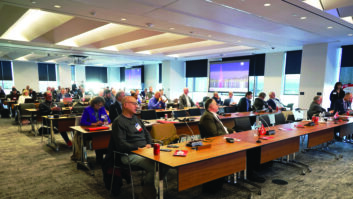
ARLINGTON, VA.: Broadcasting is costing the country $14,444 a minute. So says the Consumer Electronics Association, one of the most aggressive supporters of the National Broadband Plan and a long-time frenemy of broadcasting. The lobby has set up a “Spectrum Crunch Clock,” similar to the National Debt Clock, which flashes an ever-increasing sum like a rogue gas pump. Says the CEA:
“The . . . Federal Communications Commission unveiled a bold plan to address the nation’s shortage of wireless broadband capability by repurposing unused broadcast spectrum, but intense lobbying by broadcast television stations has stalled progress on this vital program.”
So the CEA launched its clock “to help Americans visualize the economic costs of delay in spectrum reform.” The lobby says it has “calculated the value of lost opportunity to the U.S. economy and American consumers. Each minute the spectrum is not reallocated to higher value services, the American public is realizing a lost opportunity cost of $14,444, or $7.6 billion each year.”
The underlying math is not described, but it appears to be based on the assumption that the 140 MHz of broadcast spectrum targeted for broadband redesignation will bring $33 billion at auction. The clock is at $33.273 billion and counting down by the second. The National Association of Broadcasters is likely formulating their response to the CEA’s Spectrum Crunch Clock.
And so it was. What the NAB’s Dennis Wharton said: “Instead of engaging in productive dialogue, we’ve come to expect childish gimmicks and hysteria from our CEA friends. The facts are these: broadcasters gave back 108 MHz of spectrum less than two years ago, some of which has yet to be deployed. NAB has never opposed the notion of broadcasters voluntarily giving back additional spectrum, so long as non-volunteers are held harmless. Finally, we would suggest that CEA ask whether Alabamans who are crediting local television with saving their lives during tornado coverage last week whether TV spectrum is ‘underutilized.’”
~ Deborah D. McAdams












